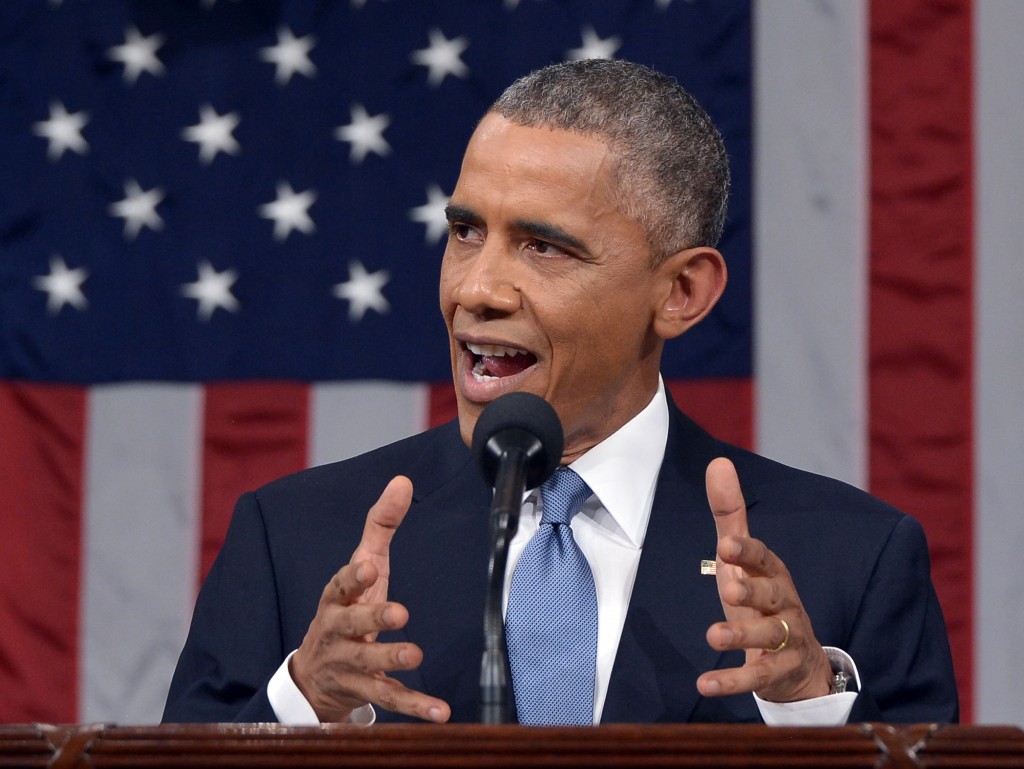- California Assembly OKs highest minimum wage in nation
- S. Korea unveils first graphic cigarette warnings
- US joins with South Korea, Japan in bid to deter North Korea
- LPGA golfer Chun In-gee finally back in action
- S. Korea won’t be top seed in final World Cup qualification round
- US men’s soccer misses 2nd straight Olympics
- US back on track in qualifying with 4-0 win over Guatemala
- High-intensity workout injuries spawn cottage industry
- CDC expands range of Zika mosquitoes into parts of Northeast
- Who knew? ‘The Walking Dead’ is helping families connect
Obama vows to defend against cyber-attacks in State of Union address without mentioning N. Korea

President Barack Obama delivers his State of the Union address to a joint session of Congress on Capitol Hill on Tuesday, Jan. 20, 2015, in Washington. (AP Photo/Mandel Ngan, Pool)
WASHINGTON, Jan. 20 (Yonhap) — U.S. President Barack Obama vowed Tuesday to defend against cyber-attacks, saying “no foreign nation” should be able to disrupt American networks, but he made no direct mention of North Korea, blamed for the hack on Sony Pictures.
Cyber-security was one of the main topics in Obama’s State of the Union address, along with the economy and the U.S-led fight against the militant group Islamic State in Iraq and Syria, according to excerpts provided by the White House.
“No foreign nation, no hacker, should be able to shut down our networks, steal our trade secrets or invade the privacy of American families, especially our kids. We are making sure our government integrates intelligence to combat cyber-threats, just as we have done to combat terrorism,” Obama said before a joint session of Congress.
By “foreign nation,” Obama appeared to refer to countries like North Korea, but he did not mention the communist nation by name.
Obama also urged Congress to pass the cyber-security legislation.
“If we don’t act, we’ll leave our nation and our economy vulnerable. If we do, we can continue to protect the technologies that have unleashed untold opportunities for people around the globe,” he said.
Obama has made cyber-security a top priority in his agenda for this year, especially following the North’s alleged hacking attack on Sony. Last week, hackers claiming to be working on behalf of IS militants, also briefly took over the Twitter and YouTube accounts for the U.S. Central Command.
Earlier this month, Obama put forward a fresh legislative proposal encouraging companies to share threat information with the government and proposed strengthening laws against identity thefts by requiring notification when consumer information is hacked.
The White House also plans to host a cyber-security summit at Stanford University next month.
After the FBI determined the North was responsible for the hack on Sony, Obama strongly condemned the attack and vowed to respond proportionally. Early this month, Obama authorized fresh sanctions on North Korean entities and officials, including the General Reconnaissance Bureau, Pyongyang’s top spy agency.
A key theme of Tuesday’s speech came at the beginning as Obama said it’s time to “turn the page” after “two long and costly wars” and “a vicious recession.” Now, Obama stressed, the American economy is growing and creating jobs at the fastest pace since 1999.
“At this moment, with a growing economy, shrinking deficits, bustling industry and booming energy production, we have risen from recession freer to write our own future than any other nation on Earth. It’s now up to us to choose who we want to be over the next fifteen years, and for decades to come,” he said.
“Will we accept an economy where only a few of us do spectacularly well? Or will we commit ourselves to an economy that generates rising incomes and chances for everyone who makes the effort?” Obama said, calling for support of the middle-class.
Obama proposed tax hikes on the wealthy, saying the country should close the “loopholes that lead to inequality by allowing the top one percent to avoid paying taxes on their accumulated wealth.” Money raised from tax increases can be used to pay for expanded tax credits and educational benefits, he said.
A series of foreign policy issues facing the U.S. came up during the speech, including the fight against the IS, the situation in Ukraine, the decision to normalize relations with Cuba, nuclear negotiations with Iran and the fight against the Ebola virus in West Africa.
“In the Asia Pacific, we are modernizing alliances while making sure that other nations play by the rules, in how they trade, how they resolve maritime disputes and how they participate in meeting common international challenges like nonproliferation and disaster relief,” he said.
There was no mention of North Korea or its nuclear or missile programs.
Obama made no mention of the North in last year’s State of the Union address or in his address at the U.N. General Assembly in September, reinforcing widespread views that the communist nation has been pushed onto the back burner on the U.S. priority list.
Obama, who assumed presidency in 2009, mentioned the North in his State of the Union addresses in 2010, 2011 and 2013. In those speeches, he warned the communist nation of further sanctions and isolation unless it gives up its nuclear program.
The annual address is closely watched by other nations as a gauge of the direction of U.S. foreign policy.















